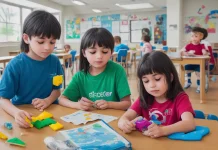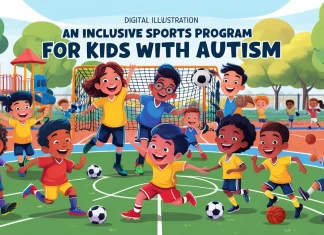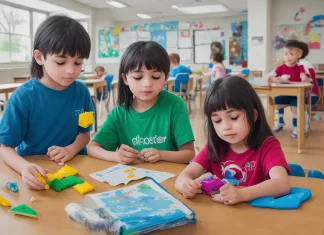Introduction
Understanding the unique challenges faced by individuals with Down Syndrome and Autism is crucial for effective social skills development. In this article, we’ll explore the intersection of these conditions, shedding light on strategies, interventions, and success stories that contribute to enhanced social engagement.
Understanding Down Syndrome and Autism
Characteristics of Down Syndrome
Down Syndrome, a genetic disorder caused by an extra copy of chromosome 21, manifests with distinctive physical features and varying intellectual abilities. Individuals with Down Syndrome often face challenges in cognitive development.
Characteristics of Autism
Autism, on the other hand, is a neurodevelopmental disorder characterized by difficulties in communication, social interaction, and repetitive behaviors. Autistic individuals may exhibit a wide spectrum of symptoms, making each experience unique.
Commonalities and Differences
Despite the differences in etiology, individuals with Down Syndrome and Autism often share challenges in social skills development. Recognizing both the commonalities and distinctions is essential for tailored interventions.
The Impact on Social Skills Development
Social Challenges Faced by Individuals with Down Syndrome
Individuals with Down Syndrome may encounter challenges in forming friendships, understanding social cues, and navigating complex social situations. Early intervention plays a crucial role in addressing these difficulties.
Social Challenges Faced by Individuals with Autism
Autistic individuals often struggle with communication barriers, difficulty in interpreting non-verbal cues, and forming meaningful connections. The combination of Autism and Down Syndrome intensifies these challenges.
Combined Impact on Social Skills Development
The dual diagnosis of Down Syndrome and Autism amplifies the complexity of social skills development. Understanding the combined impact is vital for implementing effective interventions.
Early Intervention Strategies
Importance of Early Intervention
Early intervention significantly influences the trajectory of social skills development. Identifying challenges early and implementing targeted strategies can pave the way for improved social interaction.
Tailoring Interventions for Dual Diagnosis
Customizing interventions for individuals with both Down Syndrome and Autism requires a comprehensive approach. Addressing specific needs and adapting strategies ensures a more nuanced and effective intervention.
Family Involvement in Early Intervention
Family support plays a pivotal role in early intervention. Educating and involving families in the process enhances the consistency of strategies and promotes a supportive environment for social growth.
Speech and Language Development
Unique Language Considerations for Down Syndrome
Speech and language development in individuals with Down Syndrome may be delayed. Tailored speech therapy approaches can significantly contribute to overcoming these challenges.
Communication Challenges in Autism
Autistic individuals may exhibit varying degrees of language development challenges. Augmentative and alternative communication (AAC) tools and techniques are instrumental in enhancing communication skills.
Strategies for Improving Language Skills
Implementing diverse strategies, such as visual supports, social stories, and peer modeling, can foster language development in individuals with dual diagnosis, addressing both Down Syndrome and Autism.
Educational Approaches
Inclusive Education for Children with Dual Diagnosis
Inclusive education creates a supportive environment for children with both Down Syndrome and Autism. Collaborative efforts between educators, parents, and support staff contribute to a holistic educational experience.
Classroom Strategies for Social Skills Development
Implementing classroom strategies, such as structured routines, visual schedules, and social skills training programs, enhances the learning experience for children facing the dual challenges of Down Syndrome and Autism.
Individualized Education Plans (IEPs)
Crafting Individualized Education Plans (IEPs) ensures that the educational approach aligns with the unique needs of each student. Tailored goals and strategies are vital components of successful education for individuals with dual diagnosis.
Therapeutic Interventions
Occupational Therapy for Down Syndrome and Autism
Occupational therapy addresses fine motor skills, sensory integration, and daily living activities. Tailoring occupational therapy to the specific needs of individuals with Down Syndrome and Autism is crucial for effective intervention.
ABA (Applied Behavior Analysis) Therapy
Applied Behavior Analysis (ABA) therapy is highly effective in addressing behavioral challenges in individuals with dual diagnosis. ABA principles provide a structured and positive approach to modifying behaviors.
Social Skills Groups and Their Effectiveness
Participation in social skills groups offers a supportive environment for individuals with Down Syndrome and Autism to practice and refine their social interaction skills. Group settings encourage peer learning and camaraderie.
Coping with Sensory Sensitivities
Understanding Sensory Challenges
Individuals with dual diagnosis often experience heightened sensory sensitivities. Understanding and addressing these challenges contribute to a more comfortable and conducive environment for social growth.
Creating Sensory-Friendly Environments
Modifying environments to accommodate sensory needs is essential. This includes minimizing sensory stimuli, providing sensory breaks, and creating safe spaces where individuals can regulate their sensory experiences.
Sensory Integration Techniques
Incorporating sensory integration techniques, such as deep pressure activities and sensory diets, assists individuals in managing sensory sensitivities. These techniques contribute to an overall improvement in social engagement.
Parenting Tips and Support
Navigating the Unique Parenting Journey
Parents of children with dual diagnosis navigate a unique parenting journey. Sharing experiences, seeking support, and staying informed empower parents to better advocate for their child’s social development.
Support Networks for Parents
Connecting with support networks, both online and offline, provides parents with valuable insights and emotional support. Sharing tips and resources fosters a sense of community among parents facing similar challenges.
Sharing Experiences and Advice
Parents sharing their experiences and advice contribute to a collective pool of knowledge. Learning from each other’s successes and challenges strengthens the support system for families dealing with dual diagnosis.
Success Stories
Inspirational Stories of Individuals with Dual Diagnosis
Highlighting success stories showcases the potential for growth and achievement in individuals with both Down Syndrome and Autism. These stories inspire hope and emphasize the importance of tailored interventions.
Overcoming Social Obstacles
Detailed accounts of individuals overcoming social obstacles serve as beacons of encouragement. Success stories underscore the resilience and capabilities of those facing the dual challenges of Down Syndrome and Autism.
Celebrating Achievements
Celebrating achievements, no matter how small, fosters a positive environment. Recognizing and acknowledging progress in social skills development boosts confidence and motivation.
Advocacy and Awareness
Promoting Awareness of Down Syndrome and Autism
Advocacy efforts aim to increase awareness of the unique challenges faced by individuals with dual diagnosis. Public awareness contributes to fostering inclusive communities.
Advocacy for Inclusive Communities
Advocating for inclusive communities involves promoting accessibility, understanding, and acceptance. Creating spaces that accommodate diverse needs benefits individuals with Down Syndrome, Autism, and other developmental challenges.
Breaking Stigmas and Stereotypes
Advocacy plays a crucial role in breaking stigmas and stereotypes associated with Down Syndrome and Autism. Challenging misconceptions fosters a more inclusive and understanding society.
Technology and Social Skills
Technological Aids for Social Development
Technology offers valuable tools for social development. Apps and devices designed to enhance communication and social skills provide additional support for individuals with dual diagnosis.
Apps and Tools for Communication
Utilizing apps and tools designed for individuals with communication challenges enhances social interaction. These technologies bridge communication gaps, promoting meaningful connections.
Virtual Social Skills Programs
Virtual programs focused on social skills development provide accessible resources. Online platforms offer interactive and engaging activities to improve social skills in individuals with Down Syndrome and Autism.
Transitioning to Adulthood
Challenges in Adulthood for Individuals with Dual Diagnosis
The transition to adulthood brings unique challenges for individuals with dual diagnosis. Addressing vocational training, independent living skills, and continued support are crucial aspects of this transition.
Vocational Training and Employment Opportunities
Providing vocational training opportunities and creating inclusive workplaces facilitate the integration of individuals with Down Syndrome and Autism into the workforce. Diverse talents contribute to a more inclusive society.
Independent Living Skills
Equipping individuals with dual diagnosis with independent living skills promotes autonomy. Tailored programs and support services contribute to a smoother transition to independent living.
Community Engagement
Encouraging Social Participation
Community engagement is vital for fostering social skills. Encouraging participation in community activities, events, and clubs provides individuals with opportunities to practice and refine their social interactions.
Involvement in Community Activities
Involvement in community activities builds a sense of belonging. Individuals with dual diagnosis benefit from participating in events that align with their interests, promoting social inclusion.
Fostering Friendships and Connections
Fostering friendships and connections within the community enhances social well-being. Building a supportive social network contributes to a fulfilling and enriching life for individuals with Down Syndrome and Autism.
The Future of Social Skills Development
Ongoing Research and Advancements
Ongoing research contributes to the evolving understanding of social skills development in individuals with dual diagnosis. Stay informed about emerging interventions and strategies.
Promising Interventions on the Horizon
Innovative interventions show promise in further enhancing social skills development. Keeping abreast of new approaches ensures that individuals with Down Syndrome and Autism receive the most effective support.
Hope for Enhanced Social Integration
The future holds hope for enhanced social integration for individuals with dual diagnosis. Continued efforts in research, advocacy, and support services contribute to a more inclusive society.
Conclusion
In navigating the challenges of social skills development for Down Syndrome Autism, a multifaceted approach proves to be the key. From early intervention and educational strategies to therapeutic interventions and community engagement, each aspect plays a vital role in fostering social growth. By understanding the unique needs and combining tailored approaches, we can create a more inclusive and supportive environment for individuals facing the dual challenges of Down Syndrome and Autism.
FAQs
1. Can individuals with Down Syndrome and Autism lead independent lives?
Yes, with appropriate support and interventions, individuals with dual diagnosis can develop independent living skills and lead fulfilling lives.
2. How can technology aid in social skills development?
Technology offers various apps and tools designed to enhance communication and social skills, providing valuable support for individuals with Down Syndrome and Autism.
3. What role do parents play in the social development of their children with dual diagnosis?
Parents play a crucial role in supporting the social development of their children by actively participating in early intervention, seeking support networks, and sharing experiences and advice.
4. Are there success stories of individuals overcoming social challenges with dual diagnosis?
Yes, there are numerous inspirational success stories of individuals with Down Syndrome and Autism overcoming social obstacles, showcasing the potential for growth and achievement.
5. How can communities become more inclusive for individuals with dual diagnosis?
Communities can become more inclusive by promoting awareness, breaking stigmas, and creating accessible spaces that accommodate the diverse needs of individuals with Down Syndrome and Autism.


























